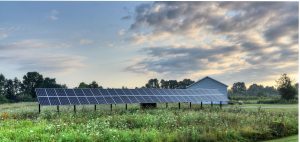
On September 21, State Rep. Donna Bullock, D-Phila., introduced H.B. 1799 at a joint news conference with PECO in Philadelphia. Dubbed “PA Solar for All”, the billamends Title 66 of the Pennsylvania Consolidated Statutes to:
- Allow electric utilities to build, own, and operate Pennsylvania based solar projects to meet their obligations under the Alternative Energy Portfolio Standards Act. Electricity generated by these solar projects could be sold on the wholesale market to other electric companies as long as the net proceeds are returned to the customers from whom the solar project cost is being recovered.
- Electric distribution companies may enter into contracts for the procurement of alternative energy credits for their customers. Utilities can then offer special rates on a competitively-neutral basis where their customers can fund local solar development through donations on their monthly bills.
- Use alternative energy and alternative energy credits generated by solar energy to develop pilot solar initiatives that enable low income customers to share in the value of solar energy production.
- Allow electric distribution company to offer incentives to net-metered customer-generators to install “smart” inverters and battery storage systems on the customer’s net-metered system that allow the electric distribution company to monitor and control energy delivered to the grid. The utilities will also be able to recover the cost of these incentive programs.
For Rep. Bullock, the bill’s main benefit is to provide a source of cheap electricity of the state’s low income population. During the announcement, Rep. Bullock said, “Many families in Philadelphia are forced to choose between heating their homes and what’s for dinner.” By allowing utilities to build and operate solar energy projects, they will be able to provide lower electric rates in Pennsylvaniato low-income residents electricity at a discounted rate.
The bill facilitates more ways for local utilities to meet requirements of Pennsylvania’s Alternative Energy Portfolio Standard (AEPS). The law requires that 18% of the states electricity comes from renewable sources by 2021. Currently, the state’s AEPS is at 13%.
Rep. Bullock does expect the House Republican majority to oppose the bill, however, she is hoping for bipartisan support. The bill has been referred to the House Consumer Affairs Committee.
Also published on Medium.
